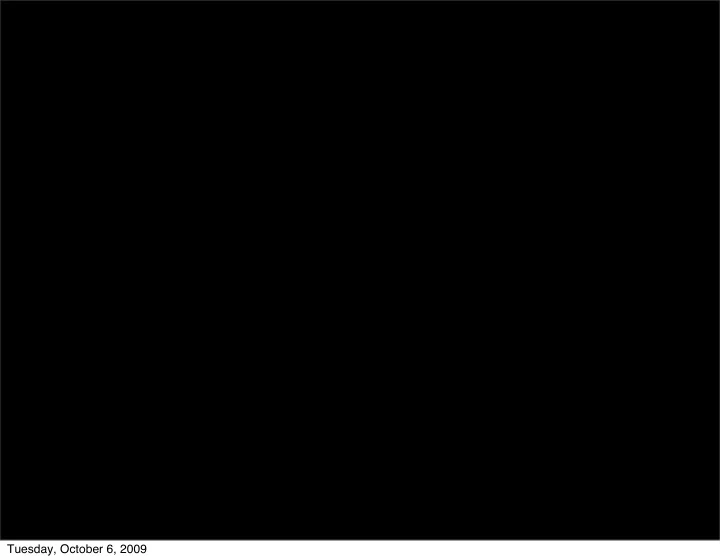

Tuesday, October 6, 2009
Intercultural Dialogue Through the Arts: Models of Good Practice Tuesday, October 6, 2009
Tuesday, October 6, 2009
Tuesday, October 6, 2009
With the telegraph Western man began a process of putting his nerves outside his body. Previous technologies had been extensions of physical organs: the wheel is a putting-outside-ourselves of the feet; the city wall is a collective outering of the skin. But electronic media are, instead, extensions of the central nervous system, an inclusive and simultaneous field. Since the telegraph we have extended the brains and nerves of man around the globe. As a result, the electronic age endures a total uneasiness, as of a man wearing his skull inside and his brain outside. We have become peculiarly vulnerable . Marshall McLuhan The Agenbite of Outwit Note: The title Agenbite of Outwit comes from the old English phrase, "agenbite of inwit" which meant "remorse of conscience." Tuesday, October 6, 2009
Tuesday, October 6, 2009
In a world with too many voices speaking all at once, a world where syncretism and parodic invention are becoming the rule, not the exception, an urban, multinational world of institutional transience where American clothes made in Korea are worn by young people in Russia, where everyone’s “roots” are in some degree cut in such a world it becomes increasingly difficult to attach human identity and meaning to a coherent “culture” or “language”. James Clifford The Predicament of Culture 2002 Tuesday, October 6, 2009
Tuesday, October 6, 2009
Wayangwong Class at Theatre Training and Research Programme Tuesday, October 6, 2009
Bharatanatyam Class at Theatre Training and Research Programme Tuesday, October 6, 2009
“Yet if the only form of tradition, of handing down, consisted in following the ways of the immediate generation before us in a blind or timid adherence to its successes, "tradition" should positively be discouraged. We have seen many such simple currents soon lost in the sand; and novelty is better than repetition. Tradition is a matter of much wider significance. It cannot be inherited, and if you want it you must obtain it by great labour. It involves, in the first place, the historical sense, which we may call nearly indispensable to anyone who would continue to be a poet beyond his twenty-fifth year; and the historical sense involves a perception, not only of the pastness of the past, but of its presence; ... Tuesday, October 6, 2009
... the historical sense compels a man to write not merely with his own generation in his bones, but with a feeling that the whole of the literature of Europe from Homer and within it the whole of the literature of his own country has a simultaneous existence and composes a simultaneous order. This historical sense, which is a sense of the timeless as well as of the temporal and of T S Elliot; Tradition and the Individual Talent the timeless and of the temporal together, is what makes a writer traditional. And it is at the same time what makes a writer most acutely conscious of his place in time, of his contemporaneity.” T. S. Eliot; Tradition and the Individual Talent, 1920 Tuesday, October 6, 2009
Beijing Opera sheng Class at Theatre Training and Research Programme Tuesday, October 6, 2009
It has been quite obvious over the past decades that, at multiple centres of the Asian cultural basket, received notions of tradition in the performing arts have been under siege. At the core of the ferment is the deep-seated desire of the community of artists and thinkers in this part of the globe to re-negotiate their artistic identities from within their own rich resource of a plural form-language, and yet remain free of the constraints and limitations that such conventions imply. Tradition is what enables a set of defining ideas and concepts to renew themselves and stay relevant over time – not something meant to be pickled and bottled with built-in artificial shelf-life. Sadanand Menon Tradition As A Limiting Notion Within Indian Performing Arts, 2002 Tuesday, October 6, 2009
Noh Class at Theatre Training and Research Programme Tuesday, October 6, 2009
Tuesday, October 6, 2009
Open Culture contemplates a transcendence of the individual from race and tradition-bound communities to embrace a diverse global community. [It] provides resources for and provokes dynamic interaction. Open Culture begets open futures. Kuo Pao Kun, Contemplating an Open Culture: Transcending Multiculturalism, 1998 Tuesday, October 6, 2009
Acting Class at Theatre Training and Research Programme Tuesday, October 6, 2009
Tuesday, October 6, 2009
Tuesday, October 6, 2009
One soul is full of a thousand internal contrarieties ... Plato The Republic Tuesday, October 6, 2009
Tuesday, October 6, 2009
Recommend
More recommend